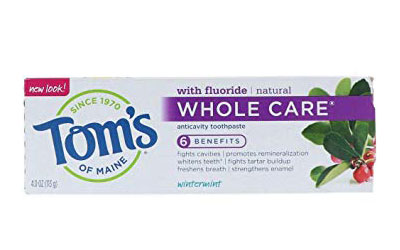Colgate’s Tom’s Of Maine Back In Federal Court Over ‘Natural’ Claims
Executive Summary
Tom's natural claims on toothpastes and deodorants are false and misleading, a plaintiff alleges in a proposed class action filed in Massachusetts federal court. Similar to previous complaints against Colgate/Tom’s, the plaintiff’s case is premised on the contention that “natural,” as opposed to “100% natural,” means no synthetic ingredients.
Consumers assume that “natural” products contain no synthetic ingredients, an expectation that Tom’s Of Maine toothpastes and deodorants do not meet, despite their natural claims, a plaintiff alleges.
Angela Munsell filed her proposed class action on 13 December 2019 in the US District Court for the District of Massachusetts.
She aims to represent Tom’s of Maine purchasers in Massachusetts and Rhode Island whom she says were injured to the extent that they paid premiums for falsely labeled and/or advertised products.
She highlights the presence of xylitol, sodium lauryl sulfate, glycerin, xantham gum and sorbitol in Tom’s toothpastes, and glycerin, glyceryl laurate, propylene glycol, ascorbic acid and aluminum chlorohydrate in Tom’s deodorants.
“Because the Products contain artificial, synthetic and/or chemically processed ingredients, the representations on the packaging and labels of Tom’s of Maine Products that they are ‘natural’ are deceptive, false and misleading to consumers,” Munsell asserts.
The FTC has offered little formal guidance on use of natural claims, but has indicated that it does not believe consumers interpret natural and all-natural claims as synonymous.
Colgate is no stranger to suits of this nature and has had mixed results in defending them. (Also see "Delaying 'Natural' Personal Care Claims Litigation Until FDA Acts Comes Naturally – Colgate" - HBW Insight, 14 Jun, 2017.)
In October 2017, plaintiffs led by Schuyler White in California’s Southern District agreed to voluntarily drop their suit against Colgate regarding the truthfulness of natural claims on Tom’s products “due to the unique facts and circumstances presented by this case,” according to the parties’ joint filing.
A similar case in New York’s Southern District remains pending, though plaintiffs Anne de Lacour, et al., failed in September 2019 with their motion to certify a nationwide class of Tom’s purchasers. They were granted leave to refile with evidence and analysis addressing problematic elements cited by the court.
 Tom's Natural Whole Care Anticavity Toothpaste contains ingredients including sodium monofluorophosphate, glycerin, xylitol and sodium lauryl sulfate.
Tom's Natural Whole Care Anticavity Toothpaste contains ingredients including sodium monofluorophosphate, glycerin, xylitol and sodium lauryl sulfate.
Prior to those suits, Colgate reached a $4.5m class settlement in Florida’s Southern District in early 2016 with plaintiffs led by Allison Gay, who targeted natural claims on various Tom’s products, including “Naturally Dry” antiperspirant labeling. (Also see "'Natural' Oral-Care Settlements Signal Risky Ingredients In Regulatory Void" - HBW Insight, 16 Feb, 2016.)
Though Colgate retained the right to use the Naturally Dry antiperspirant claim under terms of the deal, it later was advised by the National Advertising Division to discontinue the claim because the active ingredient in the Naturally Dry line, aluminum chlorohydrate, was not natural. The National Advertising Review Board upheld the NAD’s decision. (Also see "Tom’s ‘Naturally Dry’ Claims Survived Class Action, Only To Perish At NAD" - HBW Insight, 30 Mar, 2017.)
The Federal Trade Commission has offered little formal guidance on use of natural claims, but has gone after marketers of cosmetic products allegedly advertised falsely as “all natural” or “100% natural.” In such instances, the FTC merely had to identify one or more synthetic ingredients in the formulations to make its case.
Question Remains: How Do Consumers Interpret 'Natural'?
Unqualified natural claims are trickier, given the lack of a controlling regulatory definition for the term. The FTC has indicated, however, that it does not believe consumers interpret natural and all-natural claims as synonymous. (Also see "FTC Finalizes ‘All-Natural’ Personal-Care Settlements, Offers A Word On ‘Natural’" - HBW Insight, 13 Jul, 2016.)
Plaintiffs continue to test that point in the courts.
Tarte, Inc. recently chose to settle a proposed class action in New York’s Southern District, to the tune of $1.7m, concerning its “high performance naturals” claim on cosmetic products made with synthetic ingredients. (Also see "Are ‘Natural’ Claims Equivalent To ‘All Natural’? Tarte’s $1.7m Settlement Offers Little Instruction" - HBW Insight, 5 Nov, 2019.)
Kiss My Face, LLC, an early entrant in the natural personal-care game, was hit with similar litigation in March 2017 in California’s Northern District. Lead plaintiff Andrew Gasser specifically challenged the brand's "nourish naturally" claims on body wash and lotion products, allegations that Kiss My Face parent Aliph Brands appears to have settled quietly in June 2019, judging by available court documents.
Tarte and other defendants that have elected to settle such cases admit only to fatigue and a desire to avoid further litigation costs.
Whether Munsell v. Colgate will follow a similar course, or if there will be a judgment on the merits of the plaintiff’s claims – ie, whether natural and all-natural claims are equivalent in the eyes of the court – remains to be seen.
The Natural Cosmetics Act in the US House, H.R. 5017, would define natural products, natural ingredients and naturally-derived ingredients and authorize the US Food and Drug Administration to take action against companies whose purported natural offerings do not meet the bill’s standards. (Also see "US House Bill Would Define ‘Natural’ Cosmetic, Provide FDA Enforcement Authority" - HBW Insight, 6 Nov, 2019.)
The proposed legislation has garnered seven cosponsors, all Democrats.
